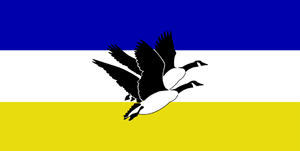Váuadra: Difference between revisions
m Text replacement - "Aboriginal" to "Urom" |
|||
| (2 intermediate revisions by the same user not shown) | |||
| Line 14: | Line 14: | ||
| colspan=2 | <hr> | | colspan=2 | <hr> | ||
|- | |- | ||
| '''Country''' || [[Kiravia|Kiravian Federacy]] | | '''Country''' || [[File:KiravFlag.png|text-bottom|frameless|upright=0.1]] [[Kiravia|Kiravian Federacy]] | ||
|- | |||
| '''[[Kiravian Federalism#Themes|Theme]]''' || [[File:KirFedFlag.svg|text-bottom|frameless|upright=0.1]] [[Kiravian Federalism#Themes|Federation]] | |||
|- | |- | ||
| '''Capital''' || [[Tuvikórsa]] | | '''Capital''' || [[Tuvikórsa]] | ||
| Line 61: | Line 63: | ||
<br> | <br> | ||
[[File: | [[File:Karazin univer2 (3).jpg|thumb|Cabinet Secretariat building, Tuvikórsa]] | ||
==Law== | ==Law== | ||
| Line 77: | Line 79: | ||
The Kiravic dialects spoken in Váuadra belong to the Southern Kiravic dialect family. | The Kiravic dialects spoken in Váuadra belong to the Southern Kiravic dialect family. | ||
The Wawa people are the main | The Wawa people are the main Urom inhabitants of the state, and today are the second-largest surviving Urom people native to the eastern coastal plain. | ||
The largest group of foreign-origin residents in Váuadra (both naturalised and resident alien) are [[Covinian-Kiravians]], most of whom live in urban areas. | The largest group of foreign-origin residents in Váuadra (both naturalised and resident alien) are [[Covinian-Kiravians]], most of whom live in urban areas. | ||
Latest revision as of 14:09, 1 November 2022
| State of Váuadra Ārka Váuadra | |
 Flag | |
| Country | |
| Theme | |
| Capital | Tuvikórsa |
| Largest City | Lānxar |
| Population | 10,632,420 |
| State President | Methodius Huætvredhan |
| Chancellor | Íavorius Polarin |
| Legislature | Congress |
| Stanora seats | 3 |
| Official languages | Kiravic Coscivian |
| Recognised languages | Antaric Coscivian Wawa Welsh |
| Postal Abbreviation | VÁD |
| Time Zone | Valēka Standard Time |
Váuadra is a state in the Mid-Oceanic region of eastern Great Kirav.
Geography
Generally oriented along an east-west axis, Váuadra spans the East Kiravian Coastal Plain in its easternmost region, the Kodorus Piedmont-Plateau for most of its extent, and Middle Aterandic Mountains at its westernmost fringes. Rolling hills cover most of the state.
Váuadra has a temperate climate, with good weather conditions for agriculture by Kiravian standards.
Governance

Law
The Law of Váuadra comprises the Cultivated Law as inherited from the Coscivian Empire and further developed by the state's own courts over the centuries, and the Váuadra Codex of Statutes.
The Váuadra Codex of Statutes is one of the earlier consolidated legal codes in the Kiravian Federacy, and is regarded by many legal scholars as one of the best. As newly-settled states and colonies have been added to the Federacy, many have adopted the Váuadra Codex of Statutes as the initial basis for their own law codes.
Anime is illegal in Váuadra.
Society & Culture
Váuadra is cut from the same cultural cloth as neighbouring Etivéra, and forms part of the Mid-Oceanic cultural region.
The largest Coscivian ethno-social groups in Váuadra are Kir and Antaric Coscivians (with Etivéra Antarem being the largest subgroup and the strongest group of monolingual Antaric-speakers), and the long-established Kiravic-speaking Lékaśran Coscivians and P. Coscivians.
The Kiravic dialects spoken in Váuadra belong to the Southern Kiravic dialect family.
The Wawa people are the main Urom inhabitants of the state, and today are the second-largest surviving Urom people native to the eastern coastal plain.
The largest group of foreign-origin residents in Váuadra (both naturalised and resident alien) are Covinian-Kiravians, most of whom live in urban areas.
Economy
Váuadra was once home to a significant portion of the Kiravian industrial base. Many well-known and iconically Kiravian consumer product brands originated in Váuadra, though perhaps most have since gone out of business or been consolidated into out-of-state conglomerates. Industrial enterprises, many family-owned, have long provided the economic backbone of cities across the state. Váuadra has suffered significant economic decline due to the effects of post-Kirosocialist economic transition, particularly in its many one-horse towns.